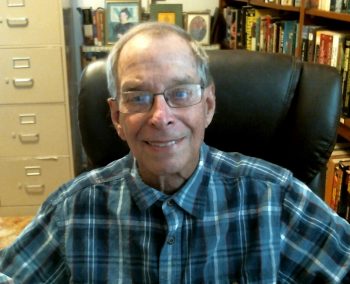
About John B. Rosenman:
John was an English professor at Norfolk State University where he designed and taught a course in how to write Science fiction and Fantasy. He is a former Chairman of the Board of the Horror Writers Association and has published 250 stories in places such as Weird Tales, Whitley Strieber’s Aliens, Fangoria, Galaxy, Endless Apocalypse, The Age of Wonders, and the Hot Blood erotic horror series. John has published two dozen books, including SF action-adventure novels such as Beyond Those Distant Stars, Speaker of the Shakk, A Senseless Act of Beauty, Alien Dreams, and the Inspector of the Cross series (Crossroad Press). He has also published a four-book box set, The Amazing Worlds of John B. Rosenman (MuseItUp Publishing). In addition, he has published two mainstream novels, The Best Laugh Last (McPherson & Company) and The Merry-Go-Round Man (Crossroad Press). Recently, he completed a science-fiction novel Dreamfarer which is the first in a new series.
What inspires you to write?
I love ideas and story concepts. In fact, I always have. When I was a small child I would say to my father, “Tell me a story.” I like to create alien worlds, fascinating characters, and prose and something poetry that is as good as I can make it. I also like to revise, though sometimes it’s a struggle.
Lately, I’ve found themed markets that challenge me and draw me in. For example, Flame Tree Press / Publishing regularly produces anthologies and a newsletter with tantalizing story themes. Sometimes I revise and hopefully improve an old, published story that fits that theme and sometimes I write a new one. A Dying Planet and Endless Apocalypse are two collections or anthologies that I’ve recently sold stories to.
What authors do you read when you aren’t writing?
Robert Silverberg, Octavia E. Butler, Stephen King, Dan Simmons, George R. R. Martin, and so on. I read them and all kinds of other writers. Dick Francis, Robert G. Williscroft, etc. Currently I'm reading a witty history of America by Michael Farquhar. It's called A Treasury of Great American Scandals.
Tell us about your writing process.
A writing process—what’s that? Seriously, I’ve tried but it doesn’t work so well for me. I suppose if I outlined my novels and had a clear idea where I was going, I wouldn’t start and stop, start and pause to get my bearings. When I’m working on a short story, I try to write the first draft as fast as possible, perhaps in one or two sessions. Otherwise, I’ve been pretty unstructured. I can’t say that I write at certain times of the day though evening is more likely. If you remember that I’m a pantser rather than a plotter, it makes sense that I don’t have much of a routine. However, I’ve written and published a lot of stuff, so I must apply my backside to the seat of the chair often.
For Fiction Writers: Do you listen (or talk to) to your characters?
Sometimes. I know the sound of their voices and inflections. Since I'm a pantser, though, I learn about them as I go along. Sometimes they surprise me. No, one female character recently told me, I"m not like that, I'm like this. Stella McMasters, the heroine of my space opera novel Beyond Those Distant Stars, kept after me to write a sequel. Once she came into my shower when I was washing up, and another time she came into bed when I was sleeping with my wife. That made for a very interesting but sticky situation.
What advice would you give other writers?
Read, read, read; write, write, write; revise, revise, revise. If possible, join a good writers’ group where expert criticism and critiques are supplied on a regular basis. Analyze everything. If a work of creative fiction astonishes you, try to identify some of the elements that make it work. Read critical articles discussing them and take a course or two in creative writing.
How did you decide how to publish your books?
I researched the science fiction and speculative fiction market and started with the best and most professional publishers. Then I turned to the small and independent press and focused on those publishers who specialized in my genre(s). I often find those publishers to be the most supportive and instructive. One of my friends is a co-publisher of Crossroad Press, so I've published several novels with him. From experience, I knew he was reliable and professional, and that influenced my choice. I would advise new authors to consult market guides online such as Ralan.com and Submission Grinder.
What do you think about the future of book publishing?
I think the future of book publishing will still involve old-style print books. People love to hold classy, leather-bound or paperback books in their hands. E-books are obviously here to stay, but I wouldn't be surprised if they take a virtual form involving visual images to complement the text, perhaps in 3-D format.
What genres do you write?: Science fiction, speculative fiction, horror, fantasy, paranormal, humorous metafiction and one young adult novel
What formats are your books in?: eBook, Print, Both eBook and Print, Audiobook
Website(s)
John B. Rosenman Home Page Link
Link To John B. Rosenman Page On Amazon
Your Social Media Links
Goodreads
Facebook
Twitter
Pinterest
LinkedIn
Instagram
All information in this post is presented “as is” supplied by the author. We don’t edit to allow you the reader to hear the author in their own voice.
